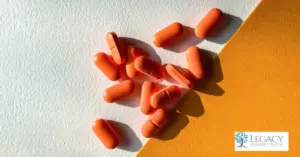
Los Angeles Alcohol Rehab
Alcohol is often seen as a way to unwind and connect with others, making social events easier to enjoy and offering a brief escape from the stressful aspects of life. Many of us have used alcohol as a comfort method to relax and feel more at ease during special events. While alcohol in moderation can be seen as beneficial, it has a darker side that some of us are all too familiar with. When clients abuse alcohol it becomes a powerful and destructive force, leading to serious health problems and strained relationships.
At our Los Angeles alcohol rehab program, our clinical team is familiar with the struggle of alcohol addiction; it can feel overwhelming and isolating. Our medical professionals create individualized treatment plans to help clients achieve long-term recovery.
Using a combination of evidence-based holistic therapies, our clinical team has created comprehensive residential programs that can help you overcome addictive substances while addressing underlying mental health conditions, known as co-occurring disorders.
Our goal is to provide multiple levels of care at each of our luxury rehabs in Beverly Hills for those seeking a range of treatments while in a supportive environment. Our wide range of programs for alcohol addiction in Los Angeles are designed to address co-occurring disorders through individual counseling and group therapy sessions to understand the aspects of addiction and help them put and keep the bottle down. Our team of professionals offers medication-assisted treatment to minimize withdrawal symptoms and provide comfortable detox allowing clients to break free from addiction and jumpstart the recovery process.
Identifying Signs of Alcohol Abuse
Recognizing alcohol abuse is beneficial to early intervention or getting someone the help they need. Here are some warning signs of alcohol abuse to look for:
- Drinking Beyond Intentions: Frequently drinking more or for longer periods than initially planned.
- Failed Attempts to Cut Back: Having tried multiple times to reduce or stop drinking without success.
- Excessive Time Spent Drinking: Spending a significant amount of time drinking, recovering from hangovers, or dealing with sickness related to alcohol.
- Constant Craving: Feeling an overwhelming urge to drink that dominates your thoughts and daily life.
- Impact on Responsibilities: Experiencing problems at work, school, or within family relationships due to alcohol use or its aftereffects.
- Persistent Drinking Despite Problems: Continuing to drink despite clear consequences for your health or relationships.
- Neglecting Other Activities: Giving up or reducing involvement in activities that were once important to you in favor of drinking.
- Risky Situations: Finding yourself in dangerous situations while drinking or afterward, increasing the risk of harm.
- Negative Emotional Impact: Persisting in drinking despite experiencing negative emotions, such as depression or anxiety, or facing health issues and memory blackouts.
- Increased Tolerance: Noticing the need to consume more alcohol than before to achieve the same effects.
What Does Alcohol Abuse Do To Your Body?
Excessive drinking not only causes behavioral issues but, in the long term, can severely affect the body and brain. Some examples of damage from alcohol abuse and withdrawal symptoms include:
- Liver Damage: Chronic drinking can lead to liver diseases such as fatty liver, hepatitis, and cirrhosis.
- Cardiovascular Issues: Long-term alcohol abuse increases the risk of high blood pressure, heart disease, and stroke.
- Digestive Problems: Alcohol can cause inflammation of the stomach lining (gastritis), ulcers, and pancreatitis.
- Weakened Immune System: Heavy drinking impairs the immune system, making you more susceptible to infections and illnesses.
- Neurological Effects: Persistent alcohol use can lead to brain damage, memory problems, and cognitive impairments.
- Mental Health Issues: Increased risk of depression, anxiety, and other mental health disorders associated with alcohol abuse.
If you notice these signs in yourself or someone you care about, it’s time to get help. Our clinical team at Legacy Healing Center has an effective and flexible drug rehab program in Los Angeles. Our specialists make our clients feel comfortable and supported throughout the recovery process as they complete the different stages at our addiction treatment center.
Legacy Healing Center’s Alcohol Addiction Treatment Programs
Our Los Angeles alcohol rehab center offers programs featuring specific approaches to make it easier for patients. Our staff keeps comfort in mind during detox services, fully understanding the symptoms of withdrawal and the mental/physical tolls addictive substances have to ensure a comfortable withdrawal process.
Alcohol Detoxification Programs
Detox is typically the first step for all alcohol rehab patients. Our alcohol detox programs are medically supervised in a safe environment so people can detox comfortably. No alcohol detoxification services are the same; our residential treatment team develops personalized care plans to manage alcohol withdrawal symptoms with medication-assisted treatment. This allows alcohol rehab patients to complete detox process comfortably and transition into our programs for alcohol detox in Los Angeles as smooth as possible.
Luxury Alcohol Rehab Center
Our alcohol rehab programs in Los Angeles utilize multiple approaches and determine which suits each patient. Every rehab program is different; some are more effective than others, and that’s okay. We work closely with individuals to find out which of our addiction therapies in LA work best for them. They might include some approaches like:
Cognitive Behavioral Therapy
Cognitive behavioral therapy (CBT) is a core component of our Los Angeles alcohol programs. This evidence-based therapy helps individuals identify and modify negative thought patterns and behaviors associated with alcohol use. By focusing on changing these patterns, CBT supports long-term sobriety and healthier coping strategies.
Trauma Therapy and Family Counseling
Many individuals turn to alcohol as a way to cope with trauma or underlying emotional pain. Our trauma therapy sessions provide a safe space to explore and address these past experiences. We use techniques to help process trauma and develop healthier ways to manage their emotions, reducing the likelihood of alcohol relapse.
Outpatient and Inpatient Treatment Programs
Our Los Angeles residential rehab offers both comprehensive outpatient treatment and inpatient drug programs. Determining which patients choose depends on their mental health care and physical health status. Our outpatient programs include regular therapy sessions and Intensive outpatient programs (IOP), providing flexibility for those who need to balance recovery goals with daily responsibilities. O
This approach allows individuals to continue their work, family, or social commitments while receiving care. For those facing more severe addiction, such as illicit drugs or prescription drugs, or complex mental health issues, such as personality disorders, bipolar disorder, or post-traumatic stress disorder, our inpatient programs offer a structured, immersive environment with 24/7 support. This setting provides a focused recovery experience, free from daily distractions.
Aftercare Services
Our alcohol addiction treatment center offers ongoing mental health treatment and outpatient treatment programs after clients have completed their inpatient program.
Legacy’s experienced team has overcome the challenges of addiction therapy by creating a recovery plan that includes ongoing therapy. Our effective treatment approach supports the healing process by combining day treatment with dialectical behavior therapy and art therapy. Relapse prevention is crucial for long-term recovery, and our specialists can help you develop a personalized treatment plan with the comfort of remaining at home.
Learn about Our Los Angeles Alcohol Rehab Program
If you or a loved one live in Southern California and are struggling with alcohol addiction, our admissions team is ready to help you take the first crucial step toward recovery. Legacy Healing Center is a top-rated luxury alcohol rehab services with a multidisciplinary team that offers personalized treatment plans at our residential treatment centers. Our clinical team can help you overcome addictive substances and address co-occurring mental health disorders through a holistic approach, leading you to a life of sobriety.
All of our rehab facilities work with most major insurance plans. Call our admissions team for a free insurance verification to check your insurance coverage. Most private health insurance plans will cover the cost of treatment for little to no out-of-pocket costs to our clients. If you have your insurance card, use the ‘Insurance Verification‘ link to check your insurance benefits or call our dedicated team at 888-534-2295 to speak with our experienced staff to learn more.
Recovery from substance abuse requires a commitment to a sober life and a healing journey that our medical staff is ready to support. Whether you are struggling with co-occurring mental health disorders or seeking a substance abuse treatment program, our treatment team is ready to help you start your road to recovery.
Don’t wait to start your recovery journey. Contact our admission specialist today to learn more about our evidence-based treatment options and how we can help you achieve a recovery program that provides lasting change. For more information on our levels of care and valuable resources on common addiction issues, read our blog.









